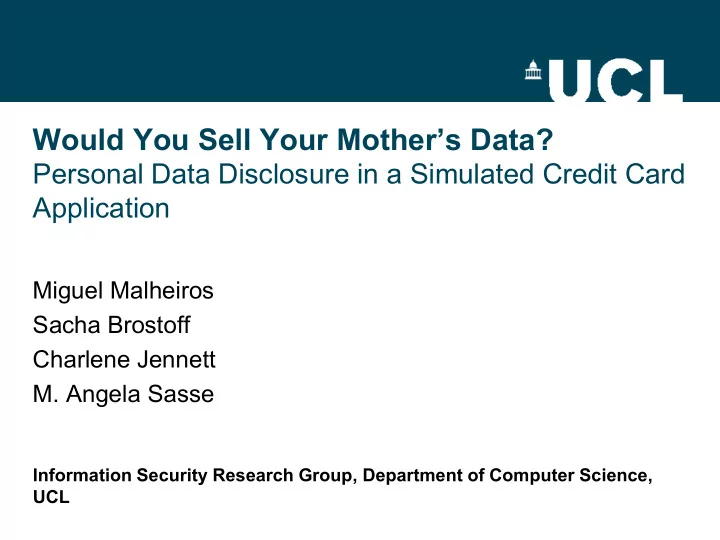

Would You Sell Your Mother’s Data? Personal Data Disclosure in a Simulated Credit Card Application Miguel Malheiros Sacha Brostoff Charlene Jennett M. Angela Sasse Information Security Research Group, Department of Computer Science, UCL
Background • Lenders assess risk of applicants defaulting • Personal data collected and fed to credit scoring algorithms • Credit scoring is not perfect • Lenders want to improve credit scoring accuracy • One way is to collect and use different data items – E.g. bill and tax payments, employer recommendations, social relationships
Hypotheses H1: Proportion of participants disclosing each data item correlates with the sensitivity of the data items H2: Participants will disclose more data when a reason for the data request is given, compared to when no reason is given H3: Privacy fundamentalists will disclose less data than privacy unconcerned or privacy pragmatists
Study 1 - Survey • 285 participants - UK nat. rep. sample • 53 items potentially relevant for creditworthiness – “internet payment history” – “insurance claims ” – “ list of friends from your social networking sites ” • 5-point comfort scale – To what extent are you comfortable disclosing this item to a lender?
Study 1 - Results • Least comfortable disclosing: – Friends ’ profiles from social network sites – List of friends from social networking sites – Your mobile phone contact list – Names, addresses and phone numbers of friends • Most comfortable disclosing: – Highest level of education – Council tax, TV license, electricity, and gas payment history
Study 2 - Experiment • 48 participants – average age: 20 years old – 1 non-student • Test the acceptability of application process for a new “Super Credit Card” • Can only be offered to very reliable people • Novel financial responsibility assessment process • Participants told that data would be validated
Study 2 - Experiment Items
Study 2 - Experiment
Study 2 - Experiment • £5 (approx. $8) regardless of submission • £50 (approx. $80) for most creditworthy participant – real trade-off between disclosing personal data and obtaining economic benefit • Study conducted “double - blind” – Experimenters told the same story as participants – Prevent bias
Study 2 - Experiment • Explanations provided for questions vs. no explanations – Q: “ Did any of your loved ones die while you were growing up? “ – E: “We need this information to help judge how your early experiences might shape your behavior as an adult – early loss has been related to later financial behavior.” • Normal order vs. reverse order • Westin’s privacy segmentation • Follow-up interview
Study 2 - Results Response Rates • 28 (58.3%) participants submitted the form • 99% average response rate for Basic items • 85% average response rate for Novel items
Study 2 - Results H1: Proportion of participants disclosing each data item correlates with the sensitivity of the data items • % participants who answered an item correlates with the sensitivity of that item ρ = 0.624, p <0.01.
Study 2 - Results H2: Participants will disclose more data when a reason for the data request is given, compared to when no reason is given • No association between explanations and – whether participants submitted the form – number of questions answered – whether participants answered a particular question
Study 2 - Results H3: Privacy fundamentalists will disclose less data than privacy unconcerned or privacy pragmatists • Significant association between (not) being privacy fundamentalist and (not) submitting form χ 2 (1) = 4.39, p < 0.05 • Non- fundamentalists 5.6 times more likely to submit form
Study 2 - Results Interviews Relevance (44) Fairness Availability (6) (6) Data Request Outcome Effort (19) (3) 3 rd Parties Sensitivity (24) (28)
Study 2 - Results Interviews “I don’t think it’s acceptable, it’s got nothing to do with my credit status” P6 Relevance (44) Fairness Availability (6) (6) Data Request Outcome Effort (19) (3) 3 rd Parties Sensitivity (24) (28)
Study 2 - Results Interviews Relevance (44) Fairness Availability (6) (6) “I know that because I Data have medical conditions it Request Outcome Effort could be used to (19) (3) discriminate against me.” P40 3 rd Parties Sensitivity (24) (28)
Study 2 - Results Interviews Relevance (44) Fairness Availability (6) (6) Data Request Outcome Effort (19) (3) “It would be difficult to get hold of 3 rd Parties Sensitivity the information, so again I was less (24) (28) inclined to provide it.” P30
Study 2 - Results Acceptability vs. Disclosure • Association between participants finding an item acceptable and disclosing it was only significant for 3 questions • Reasons given for discrepancy: – on reflection, they did not mind disclosing the data (14) – generally unacceptable, but ok in their case (10) – wanted to complete form (5)
Conclusions • More sensitive items more likely to be withheld • Providing justification for question may not help • Acceptability and disclosure not related • Use of indices of social capital as signs of creditworthiness may currently not be acceptable • Items such as TV license and council tax payment history could be used for credit scoring when applicants have “thin” credit histories.
Recommend
More recommend